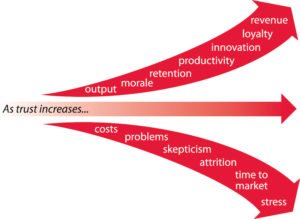We all know how important trust is in our everyday lives, but not enough companies really understand the power and impact it has in business. You may think your employees are trustworthy… but do you show how much you trust them via the responsibility you give them? Or are you like most of us business owners and THINK about the trust you have in your employees but fail to communicate and act upon that trust?
Not only is trust a crucial trait of all top leaders and a vital part of profitable businesses… it can be one of the most important factors in successfully transitioning your company to next-level management or a new buyer. Trust, or lack thereof, can completely dictate the outcome of your exit plan.
If you, as the owner, trust in your employees it creates a culture of empowerment among your workforce. Because of this it is much easier for your executive team, mid-level managers and employees to set up and fill the gaps with pride when you transition to them or a 3rd party. Trust is the most IMPORTANT part in moving yourself from the hub to the spoke.
When transitioning your company, everyone including your employees, clients, professional advisors and family is watching how you handle the situation. How you set up the process, communicate the expectations, and then trust everyone to execute what you put in place will make or break the whole process!
And then there is the matter of the transaction itself. The buyer and the seller need to trust each other and there also needs to be trust among all the folks sitting around the table, i.e. the attorneys, CPAs and perhaps even the exit planners (!!).
The Trust Edge
David Horsager wrote a great book on this topic called “The Trust Edge: How Top Leaders Gain Faster Results” where he goes into detail about the 8 different pillars of trust and how each one of them is vital to the success of a business. The introduction to the book sums it up nicely:
“The lower the trust, the more time everything takes, the more everything costs, and the lower the loyalty of everyone involved. Conversely, an environment of trust leads to greater innovation, morale, and productivity. The trusted leader is followed. From the trusted salesperson, people will buy. For the trusted brand, people will pay more, come back, and tell others. Trust, not money, is the currency of business and life!”
Check out this AMAZING graph from David’s book. There isn’t a better way to show the impact trust has in business!

Realize where you sit
So now that we agree on the value of trust; how exactly can you use it to your advantage in your business? The first thing you need to establish is exactly what your role is within your company. Many business owners fall into the trap of trying to do too much and in doing so undermine the trust of their employees. The solution is as simple as defining your own role, delegating everything else, and TRUSTING that those you empower will do their best.
Just remember… if they screw up and you trusted them to make the best decision given their ability, they will get better and grow in the experience. If you don’t believe they will grow and learn from mistakes or missteps, you have the wrong person in place and need to revisit your talent strategy or realize that YOU may be the problem. You may need to let go and actually trust them by giving your employees some space to grow!
Have a succession plan
Having a robust plan allows more room for trust. It automatically answers those questions like “should we bring employee X to this meeting?”. That isn’t to say that absolutely every member of staff needs to be hired on the basis that they will be good enough for promotion to the next level, but where possible there should be a clear path for progression.
When to let go
The key to good leadership is knowing when to intervene and when to let things go. It’s important that this is a flexible judgment to suit different workers and different situations, i.e. your level of trust in someone grows as they earn it. ‘Trust’ certainly does not mean blind faith from the very beginning. Once someone has earned your trust, it is important to not waste any time in acting on it. Invite them to meetings with senior management, introduce them to your big clients, and challenge them to produce those management reports.
The power of mistakes
Workers quite simply need the freedom to be able to make mistakes. Creating a culture that is designed to eliminate mistakes really is shooting yourself in the foot, but it is such a common trait in business. No business owner likes to lose money! We all know that we could do it better ourselves, right?!
I can guarantee you that trying to do everything yourself will 100% negatively affect your net proceeds on the sale of your business. You need to empower your employees to think for themselves, make mistakes, and get on board for the big vision. If you don’t, then any potential buyer will discount the value of the business because there is a higher risk with the owner as the hub and the rest of the employees as the spokes.
The risk is not just on the discount of the sale price of your company. The negativity that breeds from not trusting your workforce will likely cost more money in the long run than the mistakes a workforce might make when left to its own devices.
Just think about it from the other perspective… would you like a helicopter boss or would you like an empowering leader?
Leave your comments below… I would love to hear what you have to say!

